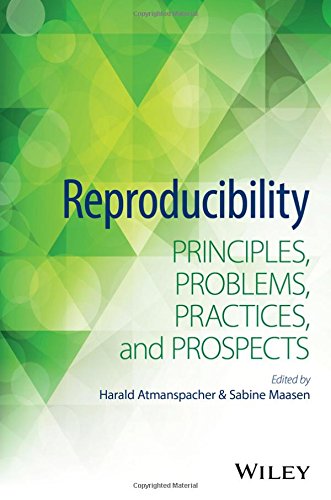(Ebook) Reproducibility: Principles, Problems, Practices, and Prospects by Harald Atmanspacher, Sabine Maasen ISBN 9781118864975, 1118864972
“A comprehensive, insightful treatment of the reproducibility challenges facing science today and of ways in which the scientific community can address them.”- Kathleen Hall Jamieson, Elizabeth Ware Packard Professor of Communication,University of Pennsylvania“How can we make sure that reproducible research remains a key imperative of scientific communication under increasing commercialization, media attention, and publication pressure? This handbook offers the first interdisciplinary and fundamental treatment of this important question.”- Torsten Hothorn, Professor of Biostatistics, University of ZurichFeaturing peer-reviewed contributions from noted experts in their fields of research, Reproducibility: Principles, Problems, Practices, and Prospects presents state-of-the-art approaches to reproducibility, the gold standard of sound science, from multi- and interdisciplinary perspectives. Including comprehensive coverage for implementing and reflecting the norm of reproducibility in various pertinent fields of research, the book focuses on how the reproducibility of results is applied, how it may be limited, and how such limitations can be understood or even controlled in the natural sciences, computational sciences, life sciences, social sciences, and studies of science and technology.The book presents many chapters devoted to a variety of methods and techniques, as well as their epistemic and ontological underpinnings, which have been developed to safeguard reproducible research and curtail deficits and failures. The book also investigates the political, historical, and social practices that underlie reproducible research in contemporary science studies, including the difficulties of good scientific practice and the ethos of reproducibility in modern innovation societies.Reproducibility: Principles, Problems, Practices, and Prospects is a guide for researchers who are interested in the general and overarching questions behind the concept of reproducibility; for active scientists who are confronted with practical reproducibility problems in their everyday work; and for economic stakeholders and political decision makers who need to better understand the challenges of reproducibility. In addition, the book is a useful in-depth primer for undergraduate and graduate-level courses in scientific methodology and basic issues in the philosophy and sociology of science from a modern perspective.Harald Atmanspacher, PhD, is Associate Fellow and staff member at Collegium Helveticum, ETH and University Zurich and is also President of the Society for Mind-Matter Research. He has pioneered advances in complex dynamical systems research and in a number of topics concerned with the relation between the mental and physical. Sabine Maasen, PhD, is Professor for Sociology of Science and Director of the Munich Center for Technology in Society (TU Munich) and Associate Fellow at Collegium Helveticum (ETH and University Zurich). Her research focuses on the interface of science, technology, and society, notably with respect to neuroscience and its applications.
*Free conversion of into popular formats such as PDF, DOCX, DOC, AZW, EPUB, and MOBI after payment.


